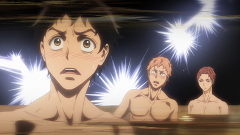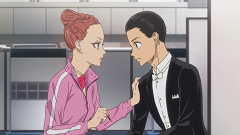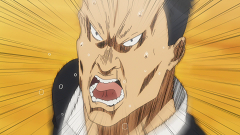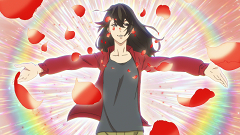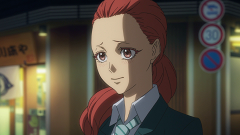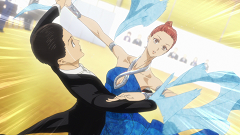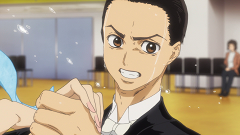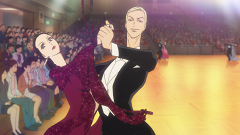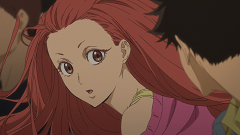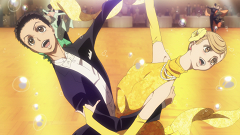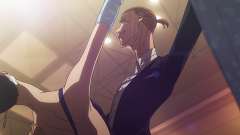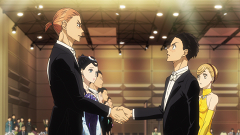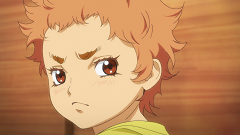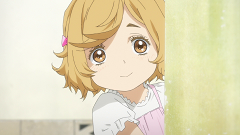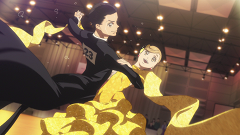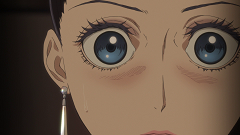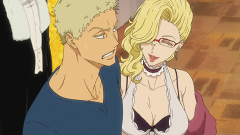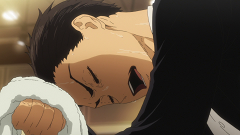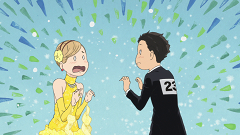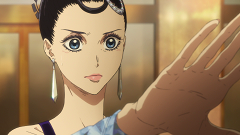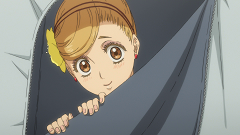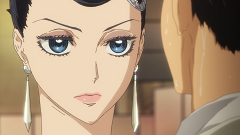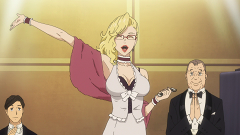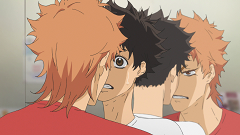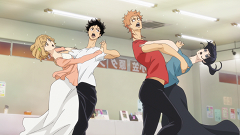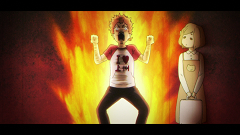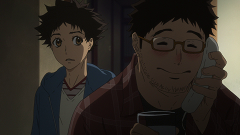It’s a good thing I didn’t go back to single episode reviews, as I promised last time, because these two didn’t leave me with a whole lot to talk about. Much of “Performer” was spent bringing Tatara and Chinatsu back together after their spat from the previous installment, but since I didn’t buy into that conflict in the first place, it ended up feeling like more of a hangout episode (with plenty of fanservice and shipping to boot). We got some uncommon character pairings, too, like Chinatsu/Mako and Tatara/Shizuku, the latter of which is a rarity these days. And while these sorts of cast shake-ups might have delighted me a couple months ago, they seemed rather utilitarian here, given the need for our main couple’s big breakup to be reversed. Thankfully, the chill-inducing conclusion to “Competitor No. 13” justified the show’s clumsier machinations – but we’ll get to that soon enough.
Ballroom e Youkoso has devoted what seems like a dozen monologues to the ideas that 1) Tatara is a poor leader, and 2) he and Chinatsu aren’t a good fit. There’s a glaring issue with this constant hammering of the same couple points, and it’s one I’ve tried not to mention too often, since it’s such a widely repeated criticism of the show. Maybe this episode was the straw that broke the camel’s back, though, because I’m compelled to bring it up: the dancing direction isn’t strong enough to communicate the same messages. We hear it verbally, but we rarely see Tatara failing as a leader. What we see are a lot of still shots, anguished expressions, and reactions from judges or crowd members. Moreover, Ballroom hasn’t properly shown its audience what successful leadership looks like in motion. We’ve just been trained to equate confidence with skill, and as anybody who’s ever played a sport knows, they’re not the same at all.
Without the choreography necessary to convey Tatara’s failures, the show falls back on dialogue to destroy and rebuild his new partnership. A lot of Chinatsu’s grief seems to stem from jealousy, which comes to the surface after she learns about the past Tatara/Mako partnership. I felt really proud of Mako for keeping her patience with Chinatsu, even after the older girl implied that dancers with consistent partners led breezy, carefree lives. Mako’s maturity aside, however, this scene boiled down to Tatara’s leadership being verbally praised, and Chinatsu deciding to give him a second chance as a result. The Tatara/Shizuku scene involved even more lip service, but was somehow less convincing – if Tatara is capable of impressing a veteran like Shizuku, why is his lack of leading ability constantly being harped on? As this scene played out, with one of Japan’s best amateur dancers calling him “a mystery,” I couldn’t help but think that Tatara has always been portrayed as an open book.
Alright, that’s enough criticism of the show’s visuals. As important as they ought to be in a show about ballroom dancing, the characters are the main attraction, and they really came through in the second of these two episodes. Being in a competitive setting once again, Tatara and Chinatsu really seemed to be click, despite their occasional bickering. The appearance of the dancers’ family members was a lot of fun, as well, especially Mine-san’s wife and child, from whom he kept his continued dancing a secret. But the thing that really sold me on the start of this arc was the final scene, where Tatara’s intensity started to overtake Chinatsu, represented both by smoke and by blood cells entering her body. Ballroom pulled out a couple of neat dance sequences for the start of the Metropolitan tournament, but taken alone, those wouldn’t have been enough to convince me of Chinatsu’s sensation. This show tends to hit a home run whenever it uses visual metaphors this way, so I’m glad it went back to that well. It’s no small task to convince your audience that someone as stubborn as Chinatsu would give control to another person, but the creative team took a good first step with this episode.

